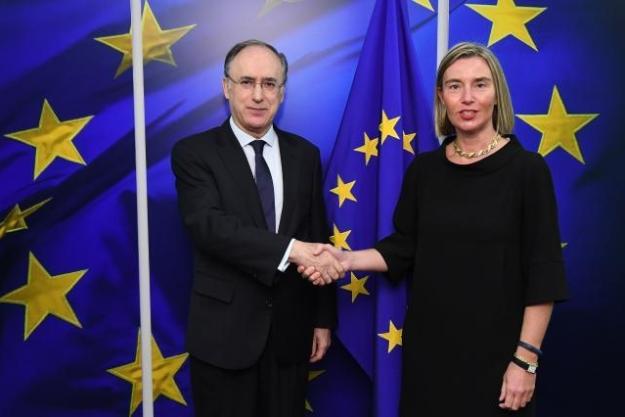
THE HAGUE, Netherlands — 8 November 2018 — The Director-General of the Organisation for the Prohibition of Chemical Weapons (OPCW), H.E. Mr Fernando Arias, met with the Ambassadors and senior diplomats to the OPCW based outside of The Hague and the Vice-President/ High Representative of the European Union (EU) for Foreign Affairs and Security, H.E. Ms Federica Mogherini, during his visit to Brussels, Belgium.
During the Director-General’s meeting with the Permanent Representatives to the OPCW based outside of The Hague, the Director-General discussed issues pertaining to the upcoming Twenty-Third Session of the Conference of the States Parties (CSP-23) and the Fourth Review Conference of the States Parties (RC-4). The Director-General expressed his appreciation to the Member States for “their on-going commitment and strong support of the Chemical Weapons Convention and the work of the Technical Secretariat”.
The Director-General covered a range of topics including: the shift of the Organisation’s activities from destruction of declared chemical weapons to preventing their re-emergence; strengthening assistance and international cooperation related activities; efforts to counter the use of chemical weapons by non-State actors (i.e., terrorists); and planned construction of a new OPCW Centre for Chemistry and Technology. He highlighted activities related to the decision on addressing the threat from chemical weapons use; the Fact-Finding Mission in Syria; and recent incidents involving chemical weapons in the United Kingdom and Malaysia.
Additional briefings were provided by: the Chairperson of the Executive Council of the OPCW, H.E. Ambassador Jana Rainisová, who spoke about the activities of the Executive Council; the Director of the External Relations Division, Mr Kai Chen, who addressed efforts to universalise the Chemical Weapons Convention; and the Director of International Cooperation and Assistance Division, Mr Hamza Khelif, who informed the attendees about the OPCW capacity-building portfolio. The participants shared their views and concerns during question and answer sessions. The briefing was attended by 40 officials of 29 OPCW Member States, including 16 Ambassadors.
The Director-General met with the Vice President/High Representative of the EU for Foreign Affairs and Security and briefed her on the activities related to implementing the decision adopted this past June by the Special Session of the CSP addressing the threat from chemical weapons use, and other key developments ahead of the upcoming CSP-23 and RC-4.
Ms Mogherini stressed the EU’s appreciation of OPCW’s efforts to uphold the global ban against chemical weapons, and the EU’s support for the goals of the Convention and its substantive financial contributions to the Organisation’s activities.
Background
The Twenty-Third Session of the Conference of the States Parties (CSP-23) and Fourth Review Conference of the States Parties will be held from 19-30 November in The Hague.
The CSP is the principal organ of the OPCW and consists of representatives from each of the Organisation’s Member States. The Conference meets annually and oversees the implementation of the Chemical Weapons Convention, promotes the treaty’s objectives and reviews compliance with the treaty.
The Review Conference of the States Parties occurs once every five years. It is an opportunity for all States Parties to review the operations of the Chemical Weapons Convention and set a strategic direction for the OPCW for the next five years and beyond.
As the implementing body for the Chemical Weapons Convention, the OPCW, with its 193 Member States, oversees the global endeavour to permanently eliminate chemical weapons. Since the Convention’s entry into force in 1997, it is the most successful disarmament treaty eliminating an entire class of weapons of mass destruction.
Over 96% of all chemical weapon stockpiles declared by possessor States have been destroyed under OPCW verification. For its extensive efforts in eliminating chemical weapons, the OPCW received the 2013 Nobel Peace Prize.
